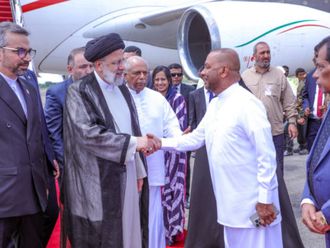Tunis: Dozens of opposition deputies have walked out of Tunisia’s constitutional assembly to protest against the final draft of a new post-Arab Spring constitution.
Singing the national anthem, the opposition members forced the closure of the session, which begins the long-awaited debate over the constitution to create a new state following the January 2011 overthrow of dictator Zine Al Abidine Bin Ali.
Opposition deputy Nadia Shaabane accused the ruling moderate Islamist party of altering the final draft of the constitution written by the assembly’s committees.
The constitutional assembly has been writing the nation’s new charter since it was elected in October 2011, taking eight months longer than its allotted year. The transition has been marked by violence, economic crisis and political bickering.
A handful of secular opposition MPs on Monday issued a statement criticising the “fraudulent process that has affected the works of the constituent committees.”
And several hundred people protested against the draft constitution outside the National Assembly, which has been repeatedly criticised for its inefficiency and the non-attendance of members.
A number of NGOs have also raised concerns about the insufficient human rights guarantees contained in the text.
Amnesty International said it undermined the principles of international human rights law by giving greater legal value to the constitution than to international treaties ratified by Tunis.
But a relatively wide consensus appears to have been forged on the division of executive powers between the president and the prime minister, which was at the centre of a major political tussle.
Ennahda had previously insisted on a pure parliamentary system before allowing the head of state to retain important powers, notably in the areas of defence and diplomacy, and the Islamists also agreed to abandon having the Quran inscribed as a source of law.
Speaking on Monday before he was forced to suspend the session, assembly speaker Mustafa Bin Jaafar, who heads Ennahda’s secular ally Ettakatol, outlined his party’s priorities.
“We wanted to build a constitution on solid bases, guaranteeing freedoms, human rights and the rights of women,” adding that the draft text “does not represent one specific party... but is a constitution for all Tunisians”.
Monday’s debate was to offer every member of parliament the chance to express an opinion on the text, before fixing a calendar for its adoption, where it requires the assembly’s approval by a two-thirds majority, failing which it must be put to a referendum.
The ruling coalition, made up of Ennahda, Ettakatol and the Congress for the Republic, another secular centre-left party, has promised to seek support for the draft constitution from opposition groups.
The main political parties were originally given a year to draft the text after the first post-revolution elections in October 2011, but the timetable was repeatedly revised amid disagreement about the nature of Tunisia’s future political system.
The new constitution must be adopted before a calendar can be drawn up for fresh elections which Prime Minister Ali Larayedh has promised to hold before the end of 2013.
Observers say that with no electoral law or body charged with organising elections yet in place, it is unlikely that parliamentary polls will be held this year.
Adopting the new constitution is seen as key to restoring stability in Tunisia and helping overcome the political crises, social unrest and violent attacks by radical Islamist groups that have rocked the country since the revolution.
“We are subject to significant pressures, security, social, economic and political,” Bin Jaafar warned Monday’s parliamentary gathering.
“We must work together to put an end to this transitional phase by organising elections as soon as possible and in the best possible circumstances.”












